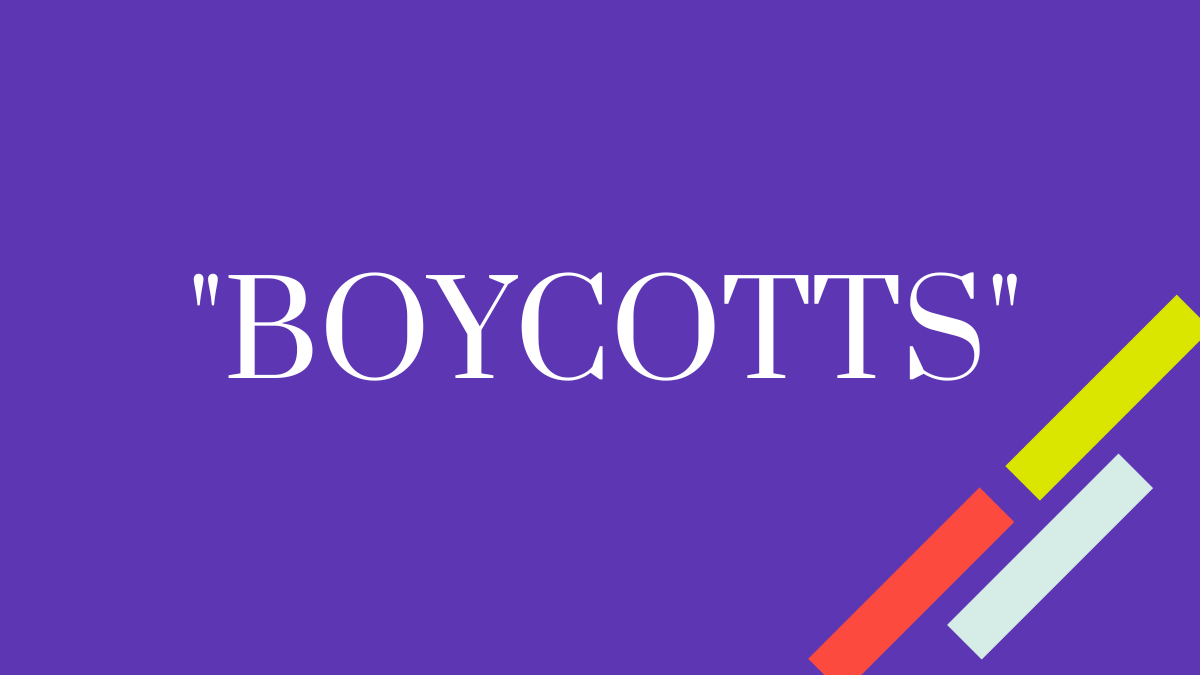In an era where consumers are becoming increasingly vocal about their values, they expect brands to mirror their convictions. This societal shift, often referred to as the global „culture war,” is particularly pronounced in the United States. Here, we’ve seen numerous instances where consumers’ cultural or political beliefs have sparked boycotts, leading to significant changes in corporate communication and business operations.
These boycotts serve as a stark reminder that consumers, when united in large numbers, wield significant power in shaping brands. In this article, we delve into several high-profile consumer boycotts, each fueled by political or cultural events, and explore the lessons they offer for marketing strategy and brand management.
Nike and Colin Kaepernick: Taking a Stand for Social Justice
In 2018, Nike, the global sportswear leader, made a bold statement by featuring former NFL player Colin Kaepernick in an advertising campaign. Kaepernick had become a symbol of resistance against racial injustices, particularly for his peaceful protest of kneeling during the national anthem at NFL games.
Nike’s decision to feature Kaepernick was met with a polarized response. Some people, viewing Kaepernick’s protest as disrespectful, expressed strong resentment towards Nike’s decision. They voiced their outrage on social media, with some even posting videos of themselves burning Nike products and vowing to boycott the brand.
However, many of Nike’s core customers, who hold socially and culturally liberal values, applauded Nike’s decision. They praised the brand for using its platform to highlight an important social issue and for standing with Kaepernick despite potential risks to its reputation.
Consequences
The Kaepernick campaign marked a significant moment in Nike’s history and in the broader landscape of corporate social responsibility. It showed that a brand could take a stand on a contentious social issue and, despite facing backlash, could emerge with its reputation not only intact but arguably strengthened among its core demographic. It underscored the power of aligning a brand with its customers’ values and using its platform to amplify important social issues. And it served as a reminder that in today’s highly politicized climate, staying on the sidelines is often not an option.
Chick-fil-A and LGBTQ+ Rights
Chick-fil-A, a well-known fast-food chain in the U.S., faced political backlash and a consumer boycott due to its stance on LGBTQ+ rights. The controversy stemmed from the company’s donations to organizations that were seen as hostile towards the LGBTQ+ community. This sparked widespread criticism and calls for boycotts.
In response, supporters of Chick-fil-A’s stance initiated a counter-boycott, which surprisingly boosted the company’s sales by about 12%, raising them to approximately $4.6 billion in the following quarter.
However, the brand’s reputation suffered a significant blow. LGBTQ+ activists launched campaigns to ban Chick-fil-A from university campuses and airports, posing a substantial risk to the company’s business performance. This led Chick-fil-A to reevaluate their donation practices and political stance.
Consequences
Eventually, Chick-fil-A issued a statement, deciding to leave the issue of same-sex marriage to the government and politicians, and refraining from taking a position. This case serves as a reminder of the potential risks and complexities when a business becomes entangled in politically charged issues.
Airbnb and Discrimination: Navigating the Two-Sided Market
In 2016, Airbnb, the popular home-sharing platform, found itself in the midst of a storm of criticism and boycotts due to instances of racial discrimination reported by its users. The platform, which had revolutionized the hospitality industry by allowing individuals to rent out their homes or rooms to travelers, was suddenly under fire. The issue of racial discrimination, a long-standing societal problem, had infiltrated the digital space and was now threatening to tarnish Airbnb’s reputation.
The controversy began when users seeking accommodation on the platform started sharing their experiences of discrimination. These stories, often shared on social media or public forums, painted a disturbing picture. Prospective guests, usually based on their skin color or ethnic background, were being denied bookings by hosts. Some hosts were reported to have cancelled bookings after seeing the profile pictures of the guests, while others were accused of consistently ignoring requests from users of certain racial or ethnic backgrounds.
Consequences
In response to the criticism and boycotts, Airbnb acted swiftly to address the issue. The company introduced a series of measures aimed at combating discrimination and promoting diversity and inclusion on its platform. This included implementing mandatory anti-discrimination agreements for all users. Under these agreements, users were required to commit to treating everyone, regardless of race, religion, national origin, or ethnicity, without bias.
In addition, Airbnb introduced a new „community commitment” protocol. As part of this protocol, all users were asked to agree to a policy of respect and inclusion, with the aim of fostering a sense of community among users from diverse backgrounds. The company also increased its efforts to diversify its own workforce and leadership, recognizing that change needed to start from within.
Despite these measures, Airbnb continues to grapple with the issue of discrimination on its platform.
Uber and #DeleteUber: The Importance of Ethics and Corporate Culture
In 2017, Uber, the global ride-sharing behemoth, found itself in the crosshairs of a significant boycott. The controversy was sparked when Uber appeared to undermine a taxi strike in New York City. The strike was organized by the New York Taxi Workers Alliance in protest against the U.S. immigration ban, a policy that was seen as discriminatory and unjust by many. The taxi drivers, in a show of solidarity with those affected by the ban, had decided to halt services to JFK Airport, one of the city’s major international travel hubs.
Uber, however, chose to continue its services, a move that was perceived as not just breaking the strike, but profiting from it. To make matters worse, Uber turned off surge pricing during the strike, a decision that was seen as an attempt to incentivize customers to use their service over taxis. This was interpreted by many as a blatant disregard for the political and human rights issues at stake, painting Uber as indifferent and irresponsible.
The public response was swift and severe. The hashtag #DeleteUber began trending on social media, as users expressed their dissatisfaction and disappointment with the company’s actions. Screenshots of users deleting the Uber app from their smartphones were shared widely, turning individual acts of protest into a collective movement. The boycott wasn’t confined to the United States; it quickly spread globally, reflecting the international reach of both the company and the issue at hand.
Consequences
In the aftermath, Uber took steps to improve its reputation and regain public trust. This included making donations to immigration rights organizations, establishing a $3 million legal defense fund for drivers affected by the immigration ban, and the CEO stepping down from the President’s economic advisory council. The incident underscored the fact that in the age of social media, companies are under intense scrutiny and that ethical considerations and a strong corporate culture are essential for maintaining public trust.
Facebook and Data Protection: Balancing Trust and User Engagement
In 2018, the digital world was rocked by a controversial data protection scandal involving Cambridge Analytica, a political consulting firm that had unauthorized access to the data of millions of Facebook users. The scandal unfolded after a whistleblower revealed that Cambridge Analytica had harvested the personal data of millions of people’s Facebook profiles without their consent and used it for political advertising purposes. This was one of the most significant breaches of personal data in the history of social media, and it raised serious questions about Facebook’s data protection policies and practices.
The revelation sparked significant outrage among Facebook users and the wider public. Users felt betrayed and violated, as their personal data had been used without their knowledge or consent. This was not just a breach of trust, but also a potential violation of data protection laws. In response, many users expressed their anger and disappointment through various social media platforms. The hashtag #DeleteFacebook began trending, with users encouraging each other to delete their Facebook accounts as a form of protest and boycott.
Consequence
In response to the scandal and the ensuing backlash, Facebook was forced to reevaluate and put more emphasis on its data usage practices. The company implemented several changes aimed at improving data protection and giving users more control over their data. This included making its privacy settings more user-friendly, restricting data access for third-party apps, and launching a tool that allows users to see which apps have access to their data and revoke it if desired.
However, despite these changes, Facebook continues to face criticism and accusations over its data practices. Critics argue that the company still doesn’t do enough to protect users’ data and respect their privacy rights. They point out that while Facebook has made some improvements, it has not fundamentally changed its business model, which relies heavily on collecting and monetizing user data. The company has also been accused of being slow to respond to privacy concerns and not being transparent about how it uses and shares user data.
Conclusion
The rise of digitalization and consumer power has reshaped the brand-consumer relationship, with corporate responsibility becoming a focal point. Companies need to prepare for consumers increasingly expecting brands to take responsibility in cultural and environmental issues alike.
Consumer boycotts can act as catalysts for change. However, the key takeaway from these cases is that there is no one-size-fits-all approach: each brand must develop its communication strategy based on its own values and the current societal context.










